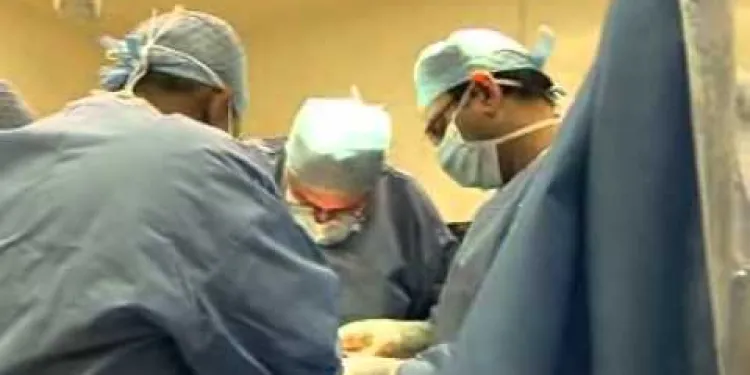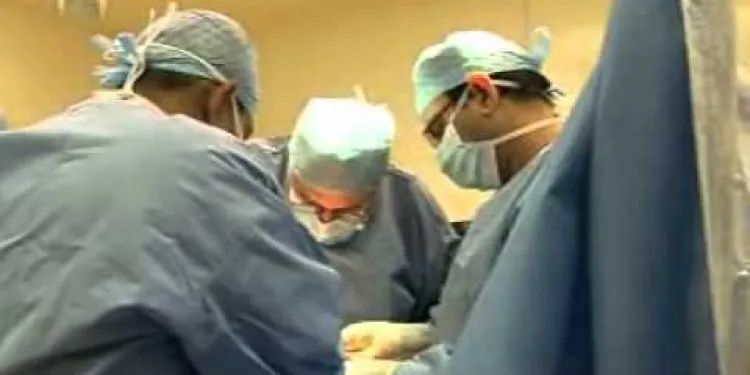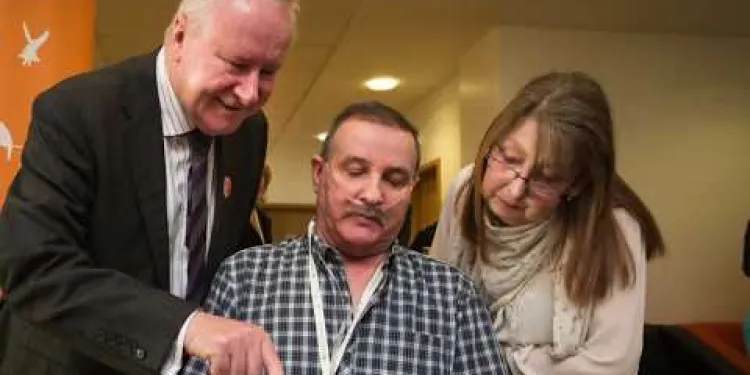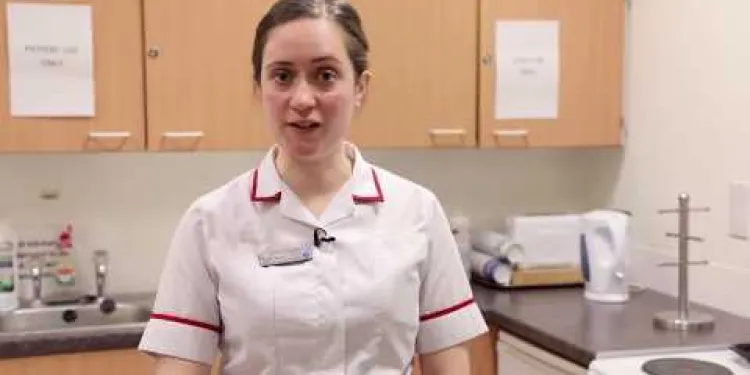Find Help
More Items From Ergsy search
-

Liver transplant - Patient experience - Part 1 (Colin)
Relevance: 100%
-

Liver transplant - Patient experience - Part 2 (Lynne)
Relevance: 98%
-

Cornea transplant patient Information
Relevance: 52%
-

Patient Stories - Having a kidney transplant
Relevance: 51%
-

Liver disease | NHS
Relevance: 49%
-

Heart-lung transplant patient shares her story
Relevance: 47%
-

Are hair transplants in Turkey safe?
Relevance: 42%
-

Having a kidney transplant
Relevance: 42%
-

Hair Transplants in Turkey
Relevance: 41%
-

Bernard's Story - Lung Transplant
Relevance: 40%
-

What is the cost of a hair transplant in Turkey?
Relevance: 39%
-

Cornea transplant - Your journey
Relevance: 38%
-

What are the risks associated with hair transplants in Turkey?
Relevance: 38%
-

Is language a barrier for a hair transplant in Turkey?
Relevance: 37%
-

What techniques are used for hair transplants in Turkey?
Relevance: 36%
-

Matthew's Story: Kidney Transplant - Part 1
Relevance: 35%
-

Kidney transplant waiting stories – DJ Ace and Lauren | NHS Organ Donation
Relevance: 35%
-

How should I prepare for a hair transplant in Turkey?
Relevance: 34%
-

How long should I stay in Turkey for my hair transplant?
Relevance: 33%
-

Mark Lancaster Patient Experience Leeds Endoscopy
Relevance: 33%
-

Will I need a follow-up visit after my hair transplant in Turkey?
Relevance: 33%
-

Sickle cell patients share their experiences with the last NHS Chief Executive Amanda Pritchard
Relevance: 30%
-

Do I need a visa for a hair transplant in Turkey?
Relevance: 25%
-

Exercise in patients with a neuropathy
Relevance: 23%
-

What are some common reasons blood transfusions are needed?
Relevance: 23%
-

Stroke - Speech and Language Therapist's Experience
Relevance: 22%
-

Neuroendocrine tumour patient video
Relevance: 22%
-

Positioning for Breathless Patient
Relevance: 22%
-

How soon can I return to work after a hair transplant in Turkey?
Relevance: 21%
-

How important is work experience for entering a nursing program?
Relevance: 21%
-

What are the common side effects of Abiraterone?
Relevance: 21%
-

Can online patient forums provide reliable information on waiting times?
Relevance: 21%
-

Can technology aid in the care of Alzheimer's patients?
Relevance: 21%
-

Can fathers experience postnatal depression?
Relevance: 20%
-

Is prior experience required to work at the National Trust?
Relevance: 20%
-

Are there online support services for prostate cancer patients on the NHS?
Relevance: 20%
-

What support is available for carers of Alzheimer's patients?
Relevance: 20%
-

Paolo Fattore Aquablation Patient Testimonial
Relevance: 20%
-

What should I do if I experience problems with my Turkey Teeth?
Relevance: 20%
-

Assessing the stroke patient
Relevance: 20%
Liver Transplant - Patient Experience: Part 1 (Colin)
Introduction
Undergoing a liver transplant is a life-changing procedure that involves significant physical and emotional challenges. This is the first part of our series, sharing the detailed patient experience of Colin, a middle-aged man from the United Kingdom, who underwent a liver transplant. His journey offers valuable insights for prospective transplant patients and their families.
The Diagnosis
Colin's journey began when he was diagnosed with cirrhosis of the liver, a condition characterized by severe liver scarring that impedes the organ's ability to function properly. Initially, Colin experienced fatigue, jaundice, and abdominal swelling, which prompted him to seek medical advice. After a series of tests and consultations with specialists, Colin was informed that a liver transplant was his best option for long-term survival.
Preparing for the Transplant
Once placed on the transplant list, Colin underwent a comprehensive evaluation to assess his overall health and suitability for the procedure. This included blood tests, imaging scans, and consultations with various healthcare professionals, including hepatologists, surgeons, and dietitians. Despite the apprehensive wait, these preparations were crucial for ensuring the success of the transplant.
The Emotional Impact
The period leading up to the transplant was emotionally taxing for Colin and his family. The uncertainty of waiting for a suitable donor organ, coupled with the fear of potential complications, took an emotional toll. Nonetheless, support from family, friends, and healthcare providers played a pivotal role in maintaining Colin's mental well-being. He also joined support groups for transplant patients, which provided a sense of community and understanding.
Conclusion
In Part 1 of Colin's liver transplant journey, we explored the initial stages of diagnosis, preparation, and emotional impact. These aspects highlight the complex process and emotional journey patients undergo before the actual transplant procedure. Stay tuned for Part 2, where we delve into the transplant surgery itself and Colin's recovery process.
Liver Transplant - Patient Story: Part 1 (Colin)
Introduction
Getting a new liver is a big and important operation. It can be really tough both for your body and your feelings. This is the first part of our story about Colin, a man from the UK. Colin had a liver transplant. His story can help other people who might need the same operation, and their families too.
The Diagnosis
Colin's story started when he found out he had a liver problem called cirrhosis. This means his liver was not working well because of scarring. At first, Colin felt very tired, his skin turned yellow, and his tummy swelled up. He went to see a doctor. After some tests, the doctors said he needed a new liver to live longer.
Getting Ready for the Transplant
Colin was put on a waiting list to get a new liver. The doctors checked his health to make sure he could have the operation. He had blood tests, scans, and talked to different doctors. Colin was a bit nervous waiting, but these steps were important to help the transplant go well.
How It Felt
Waiting for the transplant was hard for Colin and his family. They worried a lot about finding a liver and the risks of the surgery. But family, friends, and doctors were there to support Colin. He also joined groups where he could talk to others waiting for transplants, which helped him feel less alone.
Conclusion
In the first part of Colin's story, we talked about finding out about his liver problem, getting ready for the operation, and how he felt. This shows how much is involved before getting a new liver. In Part 2, we will talk about the surgery and how Colin got better after it.
Frequently Asked Questions
What is a liver transplant?
A liver transplant is a surgical procedure to replace a diseased liver with a healthy liver from a donor.
Who needs a liver transplant?
Individuals with chronic liver diseases, liver failure, or liver cancer who cannot be treated effectively with other medical treatments may need a liver transplant.
What conditions can lead to a liver transplant?
Common conditions include hepatitis, cirrhosis, liver cancer, and fatty liver disease.
How is a liver transplant performed?
The diseased liver is removed and replaced with a healthy liver from a deceased or living donor under general anesthesia.
What is the waiting time for a liver transplant in the UK?
Waiting times can vary; the priority is based on the severity of the liver disease and the patient’s overall health. On average, it can take several months to a year.
What tests are required before a liver transplant?
Patients undergo blood tests, imaging tests, liver biopsy, and other assessments to determine their suitability for a liver transplant.
What are the risks of a liver transplant?
Risks include rejection of the new liver, infection, bleeding, and complications from surgery.
What is life like after a liver transplant?
Life post-transplant involves regular medical check-ups, medication to prevent organ rejection, and lifestyle changes to ensure the health of the new liver.
How long does recovery take after a liver transplant?
Initial recovery usually takes about 3 to 6 months, but full recovery can take up to a year.
Can a liver transplant candidate work while waiting for a transplant?
It depends on the individual’s health condition. Many patients can work, but others might need to take time off due to their illness.
Are there any lifestyle changes required after a liver transplant?
Yes, patients need to adhere to a healthy diet, avoid alcohol, and stay active to maintain the health of their new liver.
Is there support available for liver transplant patients in the UK?
Yes, there are various support groups, counseling services, and patient advocacy organizations available.
What medications are needed after a liver transplant?
Anti-rejection medications, also known as immunosuppressants, are necessary to prevent the body from rejecting the new liver.
Can a liver from a living donor be used for a transplant?
Yes, a portion of a liver from a living donor can be transplanted. The liver has the ability to regenerate to full size in both the donor and the recipient.
How does the matching process for a liver transplant work?
Matching is based on the patient’s blood type, body size, severity of the liver disease, and waiting time on the transplant list.
What is a liver transplant?
A liver transplant is an operation. Doctors take out a sick liver and put in a healthy one. The healthy liver comes from another person. This can help someone feel better and live longer.
Tools and tips that can help:
- Ask someone to explain the words you don’t know.
- Watch a video about liver transplants.
- Talk to a doctor or nurse if you have questions.
A liver transplant is an operation. Doctors take out a sick liver and put in a healthy one from someone who gives it.
Who Needs a New Liver?
Some people might need a new liver. This is called a liver transplant. Here are some reasons why:
- The liver is very sick and not working well.
- A person has a liver disease.
- The liver is damaged and cannot fix itself.
Doctors will check to see if someone needs a new liver. They do tests and ask questions. This helps them decide.
If you want to learn more or need help, you can:
- Ask a doctor or nurse.
- Look at pictures or videos that show how livers work.
- Use apps with pictures and easy words to understand.
People with long-lasting liver problems, liver damage, or liver cancer might need a new liver if other treatments do not work.
What can make a person need a new liver?
Some people need a new liver because their own liver is very sick. Here are some reasons why:
- Hepatitis: This is a bad sickness in the liver.
- Cirrhosis: The liver gets too weak and cannot work well.
- Cancer: This is when bad cells grow in the liver.
- Genetic diseases: These are sicknesses that people can be born with.
- Injury: A hurt or accident can damage the liver.
If someone needs to understand more about this, they can:
- Ask a doctor or nurse for help.
- Look for easy books or videos that explain it.
- Use apps that help with learning about health.
Some liver problems are:
- Hepatitis
- Cirrhosis
- Liver cancer
- Fatty liver disease
These are all different kinds of problems that can happen to your liver.
If it's hard to read big words, try using a tool that reads out loud. You can also ask someone to help read it with you.
How is a liver transplant done?
A liver transplant is when a sick liver is replaced with a healthy one. Here is how it happens:
- The person goes to sleep with special medicine.
- A doctor takes out the sick liver.
- The doctor puts a healthy liver in the body.
- The healthy liver is connected with special tubes.
- The doctor makes sure everything is working well.
The person wakes up and starts to get better.
It can help to use pictures or videos to understand more. Talking to a doctor or a nurse can also help answer questions.
The sick liver is taken out. It is swapped with a healthy liver from someone who died or from a living person. This is done while the person is asleep from special medicine.
Tools that might help:
- Texts-to-speech tool: You can use this to hear the words aloud.
- Picture support: Drawings or photos of a liver can help understand.
- Breaking down steps: Go through each sentence slowly.
How long do people wait for a new liver in the UK?
If you need a new liver in the UK, you might have to wait.
Doctors use a list called a waiting list. They find people who need a new liver.
Some people wait for a short time, and some wait longer. It depends on how sick they are.
If you want to know more, ask the doctor or nurse. They can help you understand.
You can also use pictures or a friend to help you understand better.
How long you have to wait can be different for each person. Doctors decide who gets help first by looking at how sick someone's liver is and how healthy they are overall. Usually, it can take a few months to a year.
If you find reading hard, you can use tools that read text out loud. You can also ask someone to read with you and help you understand more.
What tests do you need before a liver transplant?
If you need a new liver, doctors have to check a few things first. These checks help to make sure you get the right care.
- Blood tests: Doctors take some of your blood. They look at it to see how healthy you are.
- Heart check: Doctors listen to your heart. They do a test to make sure your heart works well.
- Lung check: You might blow into a tube. This shows how well your lungs work.
- Scans: You might have pictures taken inside your body. This helps doctors see your liver and other organs.
If you have questions, you can always ask your doctor. They can explain it in a way that makes sense to you.
It can help to take notes or ask someone to come with you to the doctor. They can help you remember what the doctor says.
People have different tests to see if they can have a new liver. These tests include checking their blood, taking pictures of their insides, and looking at a small piece of their liver.
What are the dangers of getting a new liver?
Things that can go wrong are:
- Your body might not like the new liver. This is called rejection.
- You might get an infection. This means you could get sick.
- You could have bleeding, which means you might lose too much blood.
- Things might not go as planned during the surgery.
If you want to understand more, you can ask a doctor or nurse to explain. Or you can use a picture book to help you see what it means.
What happens after you get a new liver?
After you get a new liver, you need to see the doctor a lot. You also have to take special medicine so your body doesn't try to send the new liver away. You might need to change some of your daily habits to keep your new liver healthy.
How long to feel better after getting a new liver?
Getting better at first takes about 3 to 6 months. But to feel all better can take up to a year.
Can a person waiting for a new liver still go to work?
Some people waiting for a new liver might feel well enough to work. They can do their jobs if their doctor says it is okay.
But some people might not feel well enough to go to work. They might feel tired or sick.
If you can't work, you can try these things:
- Talk to your boss about what you can do.
- See if there are jobs you can do from home.
- Ask your doctor or nurse for help.
- Look for programs that can help you with money needs.
Remember, it's important to rest and take care of yourself while you wait for your new liver.
It depends on how the person is feeling. Some people can go to work, but others might need to stay home because they don't feel well.
Do you need to change how you live after getting a new liver?
If you get a new liver, you might need to make some changes in how you live. These changes help your body stay healthy with your new liver.
- Healthy Eating: Eat good foods like fruits, vegetables, and lean meats.
- Exercise: Do some exercise, like walking or playing outside, to stay strong.
- Medicines: Take your medicines every day as your doctor tells you.
- No Smoking or Alcohol: Do not smoke cigarettes or drink alcohol.
- Doctor Visits: Visit your doctor regularly for check-ups.
These changes can help you feel better and keep your new liver working well. You can ask someone you trust to help you with these changes.
Yes, people with a new liver need to eat healthy food. They should not drink alcohol. They should also stay active to keep their new liver healthy.
Here are some things that can help:
- Follow a meal plan with fruits, vegetables, and lean meats.
- Drink lots of water.
- Avoid junk food and sugar.
- Do fun activities like walking, cycling, or swimming.
- Ask your doctor if you have questions.
Can people who get new livers in the UK get help?
Yes, there is help for people who have liver transplants in the UK. Here is how:
- Doctors and Nurses: They help take care of you before and after the transplant.
- Support Groups: You can talk to other people who had liver transplants.
- Counselors: They can help you with how you're feeling.
These helpers can answer your questions and make sure you feel okay. ??
Yes, there are different groups and services that can help you. You can join support groups, talk to counselors, and find organizations that work to help people like you.
What medicines do you need after getting a new liver?
Anti-rejection medicine helps the new liver stay safe in the body. Without this medicine, the body might try to attack the new liver.
Can a living person give part of their liver to help someone else?
Yes, a person who is alive can give part of their liver to someone who needs it. The liver is a special organ that can grow back after a part of it is removed. This means both the person who gives the liver part and the person who receives it can be healthy.
How can we understand this better? You can use simple pictures to show how the liver donation works. Videos with clear explanations can also help. Talking with a doctor or nurse who knows a lot about livers is a good way to learn more.
Yes, a part of a liver from someone who is alive can be given to someone else. The liver can grow back to its full size in both the person who gives it and the person who gets it.
How do doctors find a new liver for someone?
Doctors look for a liver that will fit well in a person's body. This is called a "match." They check things like blood type and body size. This helps make sure the new liver will work well.
If you or someone you love is waiting for a new liver, you can:
- Talk to your doctor and ask questions if you are unsure.
- Write down important information so you can remember it.
- Use pictures or diagrams to help understand better.
- Speak to a friend or family member to help explain or remember things.
Doctors match liver transplants by checking:
- Blood type: This is the type of blood you have.
- Body size: This means how big or small your body is.
- How sick you are: This tells how bad your liver disease is.
- Time waiting: This looks at how long you have been on the list for a new liver.
It can help to talk with a doctor, nurse, or counselor about this. They can explain more and answer any questions you have.
Useful Links
Have you found an error, or do you have a link or some information you would like to share? Please let us know using the form below.
-->
This website offers general information and is not a substitute for professional advice.
Always seek guidance from qualified professionals.
If you have any medical concerns or need urgent help, contact a healthcare professional or emergency services immediately.
Some of this content was generated with AI assistance. We’ve done our best to keep it accurate, helpful, and human-friendly.
- Ergsy carfully checks the information in the videos we provide here.
- Videos shown by Youtube after a video has completed, have NOT been reviewed by ERGSY.
- To view, click the arrow in centre of video.
- Most of the videos you find here will have subtitles and/or closed captions available.
- You may need to turn these on, and choose your preferred language.
- Go to the video you'd like to watch.
- If closed captions (CC) are available, settings will be visible on the bottom right of the video player.
- To turn on Captions, click settings .
- To turn off Captions, click settings again.
More Items From Ergsy search
-

Liver transplant - Patient experience - Part 1 (Colin)
Relevance: 100%
-

Liver transplant - Patient experience - Part 2 (Lynne)
Relevance: 98%
-

Cornea transplant patient Information
Relevance: 52%
-

Patient Stories - Having a kidney transplant
Relevance: 51%
-

Liver disease | NHS
Relevance: 49%
-

Heart-lung transplant patient shares her story
Relevance: 47%
-

Are hair transplants in Turkey safe?
Relevance: 42%
-

Having a kidney transplant
Relevance: 42%
-

Hair Transplants in Turkey
Relevance: 41%
-

Bernard's Story - Lung Transplant
Relevance: 40%
-

What is the cost of a hair transplant in Turkey?
Relevance: 39%
-

Cornea transplant - Your journey
Relevance: 38%
-

What are the risks associated with hair transplants in Turkey?
Relevance: 38%
-

Is language a barrier for a hair transplant in Turkey?
Relevance: 37%
-

What techniques are used for hair transplants in Turkey?
Relevance: 36%
-

Matthew's Story: Kidney Transplant - Part 1
Relevance: 35%
-

Kidney transplant waiting stories – DJ Ace and Lauren | NHS Organ Donation
Relevance: 35%
-

How should I prepare for a hair transplant in Turkey?
Relevance: 34%
-

How long should I stay in Turkey for my hair transplant?
Relevance: 33%
-

Mark Lancaster Patient Experience Leeds Endoscopy
Relevance: 33%
-

Will I need a follow-up visit after my hair transplant in Turkey?
Relevance: 33%
-

Sickle cell patients share their experiences with the last NHS Chief Executive Amanda Pritchard
Relevance: 30%
-

Do I need a visa for a hair transplant in Turkey?
Relevance: 25%
-

Exercise in patients with a neuropathy
Relevance: 23%
-

What are some common reasons blood transfusions are needed?
Relevance: 23%
-

Stroke - Speech and Language Therapist's Experience
Relevance: 22%
-

Neuroendocrine tumour patient video
Relevance: 22%
-

Positioning for Breathless Patient
Relevance: 22%
-

How soon can I return to work after a hair transplant in Turkey?
Relevance: 21%
-

How important is work experience for entering a nursing program?
Relevance: 21%
-

What are the common side effects of Abiraterone?
Relevance: 21%
-

Can online patient forums provide reliable information on waiting times?
Relevance: 21%
-

Can technology aid in the care of Alzheimer's patients?
Relevance: 21%
-

Can fathers experience postnatal depression?
Relevance: 20%
-

Is prior experience required to work at the National Trust?
Relevance: 20%
-

Are there online support services for prostate cancer patients on the NHS?
Relevance: 20%
-

What support is available for carers of Alzheimer's patients?
Relevance: 20%
-

Paolo Fattore Aquablation Patient Testimonial
Relevance: 20%
-

What should I do if I experience problems with my Turkey Teeth?
Relevance: 20%
-

Assessing the stroke patient
Relevance: 20%


